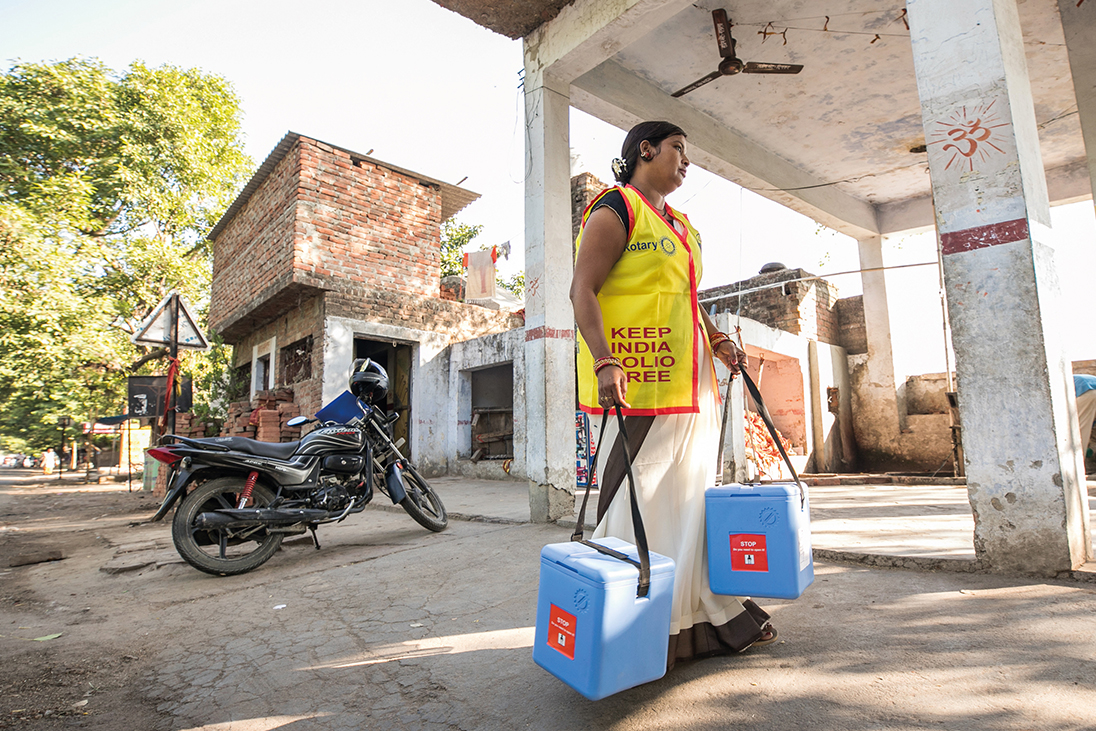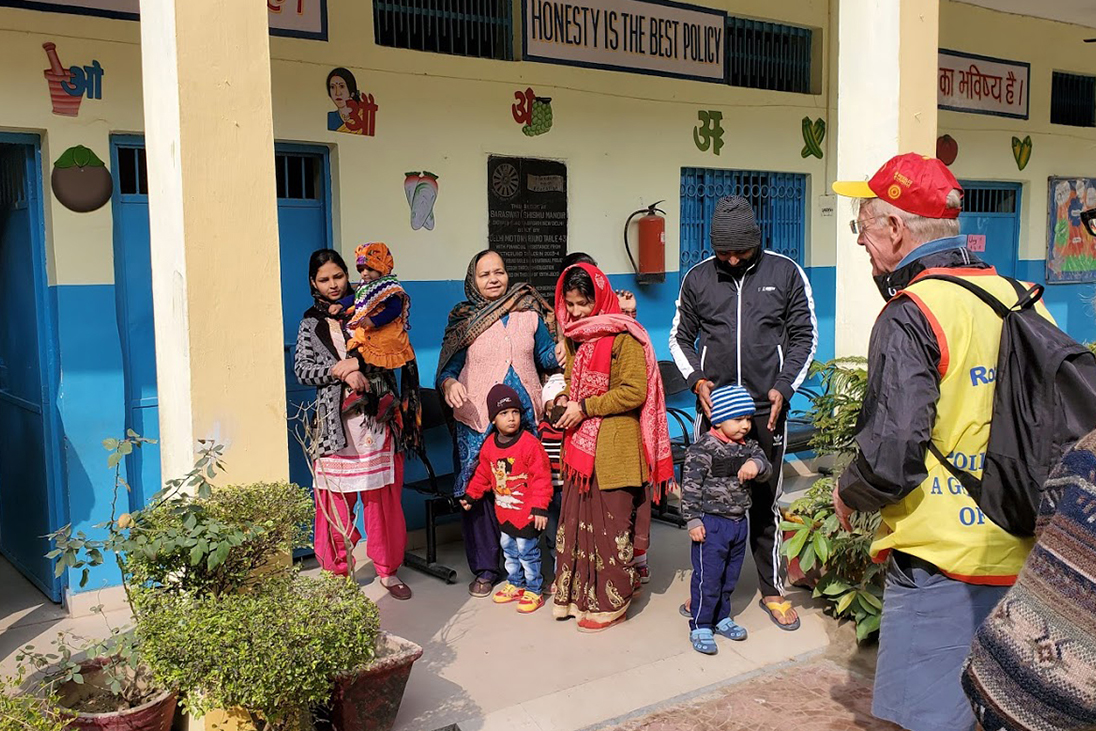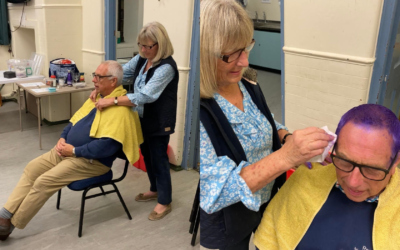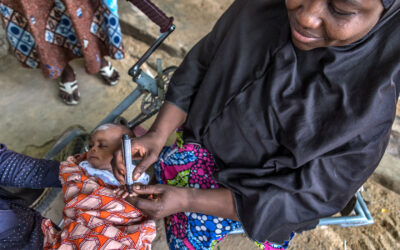Rotarians across the world have been warned against polio fatigue by Deepak Kapur, chairman of Rotary International’s Polio Plus Committee in India.
Deepak said that now the world had brought polio to its knees with it close to becoming eradicated, the price of failure would be too much.
“I would say three words to those Rotarians suffering from polio fatigue – safeguard your investment,” he said.
“You have invested decades of service, you have invested tonnes of sweat, you have invested your emotions, your tears, you have invested $1.3 billion so far and it will be $1.8 billion by the time we expect to have seen this through.
“You have built up partnerships with the World Health Organisation, governments and United Nations’ agencies across the world.
“Your own credibility is at stake. If even more is required right now, it is our bounden duty to ensure that it happens.”
Dr Deepak Kapur, Chairman of India’s PolioPlus Committee is @Rotary explains why continuing the fight against polio is so important. #endpolio @EndPolioNow pic.twitter.com/gORxm9V5oq
— Rotary GB & Ireland (@RotaryGBI) February 4, 2020
In 1985, Rotary launched its PolioPlus program, the first initiative to tackle global polio eradication through the mass vaccination of children.
And in 1988, when the Global Polio Eradication Initiative began, polio paralysed more than 1000 children worldwide every day.
Since then, more than 2.5 billion children have been immunized against polio thanks to the cooperation of more than 200 countries and 20 million volunteers.
Today, wild poliovirus continues to circulate in only Pakistan and Afghanistan, and global incidence of polio cases has decreased by 99%.
There has also been success in eradicating certain strains of the virus; of the three types of wild polioviruses, the last case of type 2 was reported in 1999 and its eradication was declared in September 2015. You can find out more about the history of polio, and where we are today here.
The most recent case of type 3 dates to November 2012 and this strain was declared as globally eradicated in October last year.


India became officially polio-free in 2014, though the last reported case was of a young girl in Bengal on January 13th, 2011.
However, with eradication so close, it requires a budget of $4.2 billion over the next three years, of which $3.27 billion has to be raised by the Global Polio Eradication Initiative, of which Rotary is part of.
The World Health Organisation has said that failure to eradicate polio from these last remaining strongholds could result in as many as 200,000 new cases every year, within 10 years, all over the world.
Speaking in Delhi to coincide with the National Immunisation Day, the long-time Rotarian, who is a member of Delhi South Rotary described Rotary as the conscience of the polio campaign.
Deepak added: “Rotary must safeguard its investment. We have put in so much.
“It is time to put in that extra bit to ensure that everything is not wasted. If we don’t, and if polio does come back, all these years of effort would be wasted, but the cost would be in excess of $40 billion.”
India became officially polio-free in 2014, though the last reported case was of a young girl in Bengal on January 13th, 2011.
Rotary must safeguard its investment. We have put in so much”
It has been a monumental achievement for a diverse nation of 1.37 billion.
Deepak Kapur recalled a time in 2001 when Dr Bruce Aylward, who was in charge of polio eradication with the World Health Organisation told him: “India is holding the world to ransom as far as polio is concerned. India will be the last nation on earth to get rid of polio.”
Deepak added: “I can remember Bruce saying ‘The world will be polio free only when India is polio-free’. He told me and a group of Rotary leaders that India would only be polio-free if the state of Uttar Pradesh becomes free of polio.
“And Uttar Pradesh would be free of polio only when the western part was free, and the western part of UP would be free only when the cities of Moradabad, Bareilly, Budaun and Rampur became rid of the virus.
“Because these are the four strongest fortresses of the polio virus in the world – and Bruce was right.


The reason we have been able to get rid of polio in the state of Uttar Pradesh and some other endemic areas is because they were literally drowned in an ocean of oral polio vaccine.
“He said the day you remove polio from Moradabad, I can assure you the world will be free from polio. Moradabad was not a very clean city. It exports a lot of brass all over the world, and the second thing it used to export was the polio virus.
“The reason Dr Aylward said all this was because of India’s massive population, the incredibly high population density, very insanitary conditions where you find all kinds of human refuse floating in the streets in open gutters, and very dirty, impure drinking water
“Even as late as the early 2000s, I have seen huge ponds which are completely green and dark, where a buffalo would be bathing and children would be filling bottles to drink that water.
“The fifth reason is the existence of a lot of malnutrition in India. For a malnourished child it becomes extremely difficult to develop the antibodies even if he or she is given adequate vaccine.
“And lastly, places such as western Uttar Pradesh had a incidence of enteric (stomach) diseases. What this meant is that this made the child like a bucket being filled with water with a hole in the bottom.
“You had children with acute diarrhea and other enteric diseases and you kept pouring vaccine into their mouths. It never stayed in the body long enough, it just moved out the other end without making the antibodies.
“This is why you had such a high incidence of polio in these areas.”
The reason we have been able to get rid of polio in the state of Uttar Pradesh and some other endemic areas is because they were literally drowned in an ocean of oral polo vaccine.”
Deepak Kapur said that India had worked hard to turn the tide and address these key issues. “India is relieved to be polio-free because of all these factors.
“The reason we have been able to get rid of polio in the state of Uttar Pradesh and some other endemic areas is because they were literally drowned in an ocean of oral polio vaccine.
“The job has really been done by the vaccine and by Rotary volunteers who have made sure their catalytic role ensures every child gets the vaccine.”
India is not the last nation on earth with polio, and Rotary India’s polio chief said that Dr Bruce Aylward later graciously apologised for this false prediction.
He revealed that Rotary in India has been working with their counterparts in Pakistan sharing advice and information to help rid the neighbouring country of polio.
And Deepak Kapur predicted it will not be long before polio is wiped from the face of the earth.
He said: “I certainly expect it to happen in my lifetime.
“I expected it to happen sooner, but we have just been held up by the unsettled conditions in our two neighbouring countries.
“If the virus can be stopped and if every child gets the vaccine, there is no reason why it should not happen soon.”










